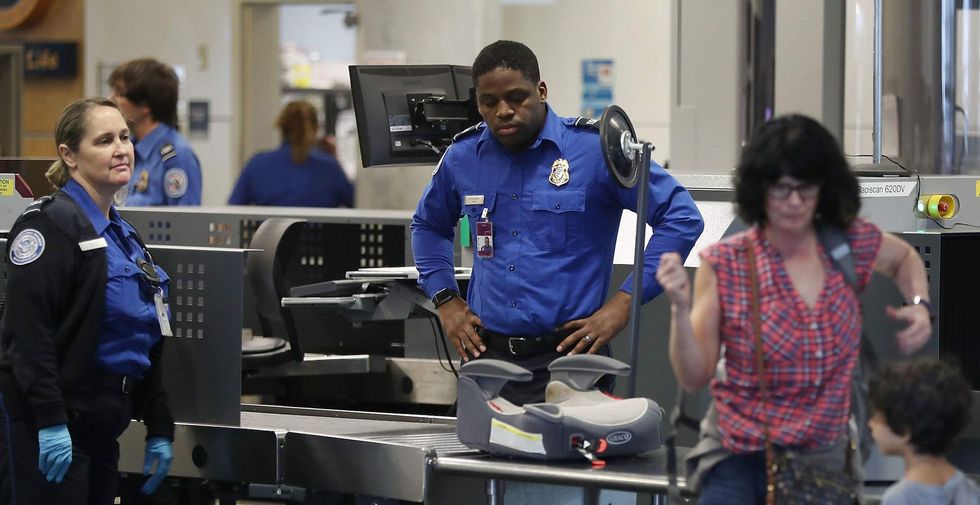President Donald Trump’s administration quietly rolled out a new rule Monday evening, barring electronic devices larger than a cellphone on flights from 10 airports that travel to the U.S. from the Middle East.
A Trump administration official said the airlines have 96 hours, starting at 3 a.m. Tuesday, to fully implement the new rule because “evaluated intelligence indicates that terror groups continue to target aviation, to include smuggling explosives in electronic devices,” according to NBC News.
The new mandate was distributed in a “confidential” email from the Transportation Security Administration, the Guardian reported, and it forbids passengers from having laptops, tablets, cameras, portable DVD players, portable printers and scanners, and video games in their carry-on bags. Instead, those devices must be placed in checked baggage.
“The fact that they are limiting this ban to a specific type of electronic device means they must have very detailed, very pristine intelligence about what the terror threat exactly is,” said Jeremy Bash, NBC’s national security analyst.
But there are some technology experts pushing back against the edict.
If there are concerns about laptops on board being used as explosives, experts told the Guardian, those same concerns would be just as valid in the checked-baggage portion of the airliner. Also, smartphones have many of the same capabilities as larger devices, such as laptops and tablets.
“It’s weird, because it doesn’t match a conventional threat model,” said Nicholas Weaver, researcher at the International Computer Science Institute at the University of California, Berkeley. “If you assume the attacker is interested in turning a laptop into a bomb, it would work just as well in the cargo hold.”
“If you’re worried about hacking,” he continued, “a cellphone is a computer.”
The policy covers roughly 50 daily, direct flights into the U.S. from nine airlines flying from 10 overseas airports.
The airlines affected:
- Royal Jordanian
- EgyptAir
- Turkish Airlines
- Saudi Arabia Airlines
- Kuwait Airways
- Royal Air Maroc
- Qatar Airways
- Emirates Air
- Etihad Airways
The airports affected:
- Queen Alia International, Amman, Jordan
- Cairo International, Egypt
- Ataturk International, Istanbul, Turkey
- King Abdulaziz, Jeddah, Saudi Arabia
- King Khalid International, Riyadh, Saudi Arabia
- Kuwait International, Farwaniya, Kuwait
- Mohammed V International, Casablanca, Morocco
- Doha International, Qatar
- Dubai International, United Arab Emirates
- Abu Dhabi International, United Arab Emirates
When the rule was first announced, reporters asked federal officials during a news briefing for details on what qualifies as “larger than a cellphone.”
“To be honest, guys, there’s a pretty universal understanding of where we’re at,” one official said after being repeatedly asked how large a phone can be before it is considered a tablet and is banned. No clear answer was given.
The Department of Homeland Security said passengers must submit to the rule “regardless of status and pre-clearance” and that the policy would remain active “until the threat changes.”
While the mandate is intended to deter potential terrorists from using explosives on an airplane, UC Berkeley law professor Paul Schwartz noted that the 9/11 attackers had a terror cell in Hamburg, Germany, which is not included in the list of affected locations.
“One potential problem with this approach where you single out countries is that you ignore the extent to which the terrorist threat is kind of state-less,” Schwartz said. “The terrorists have cells throughout the entire world.”
As for the motivation behind the rule, a State Department official referred reporters to “several terrorist events on airplanes in the last year,” all of which were outside the United States. A DHS official said there was only one incident that involved a bomb being smuggled into the cabin of an airplane.
The explosion, which was, according to CNN, detonated via a “sophisticated” laptop device in Nairobi, Kenya, resulted in one fatality on a Somali carrier called Daallo, which does not fly to the United States.



